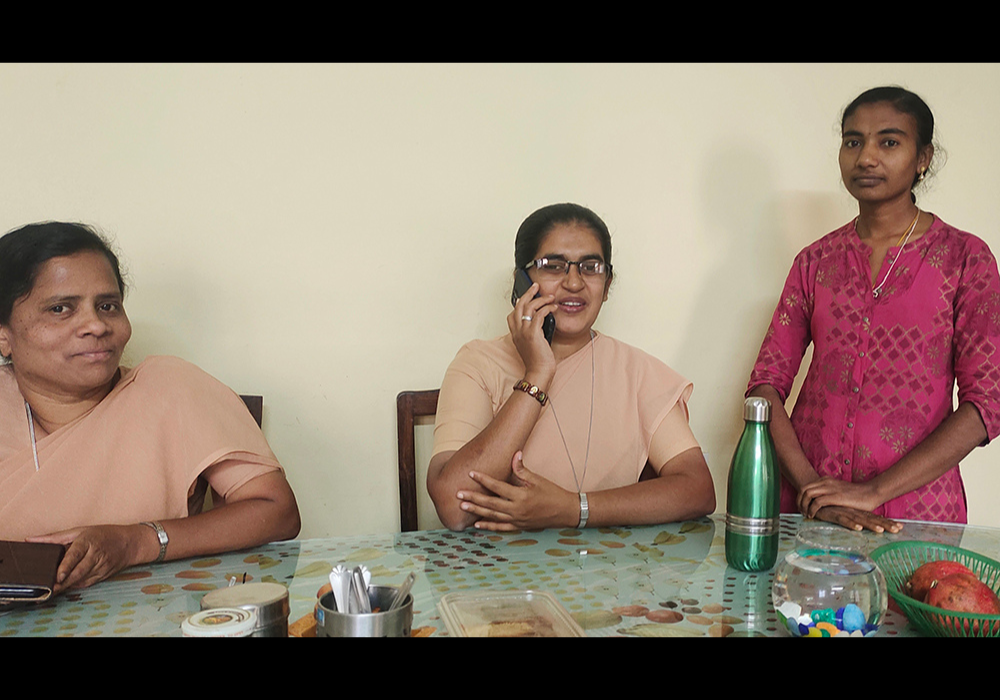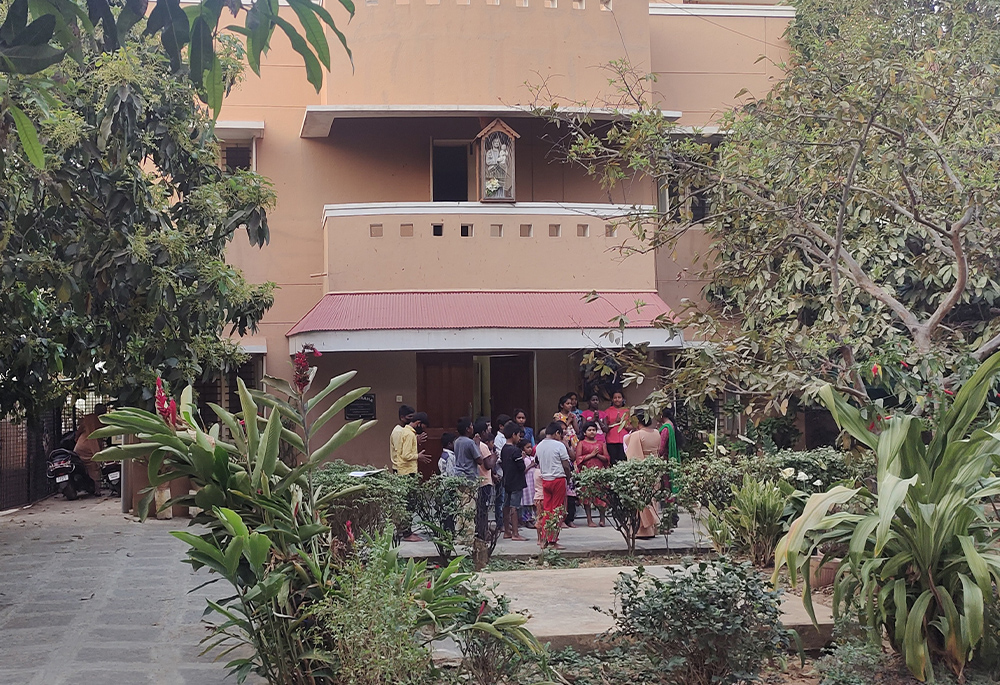
St. Joseph of Tarbes Sr. Irudaya Mary (left), and Sister Mariamma (center) with Priya Raj, a resident of Sangraha, a shelter home for destitute women and children in the southern Indian city of Bengaluru. (Thomas Scaria)
Shalini Mathew (not her real name) thanks a home for women in distress managed by the Sisters of St. Joseph of Tarbes for bringing her out of her trauma.
"I used to get up in the middle of night and scream for help, sweating profusely, dreaming of my father coming to abuse me and my younger sister," recalls the 21-year-old woman, who prefers to be called Shalini.
After eight months at Sangraha ("coming home"), Shalini moved out in October 2022 after the nuns found her a job at a computer programming firm. She now lives with her younger sister, a college student, in a paying guest accommodation.
Shalini is among hundreds of women who have found a fresh start in Sangraha, a shelter opened in 1993 by the St. Joseph sisters in Bengaluru, capital of the southern Indian state of Karnataka.
Sr. Irudaya Mary, director of the center, recalls Shalini narrating her traumatic experience at home. "She ran away with her sister to escape their father," the nun told Global Sisters Report.
Most residents of the center are victims of sexual harassment or domestic violence, or unwed mothers or runaway children. The nuns counsel and provide them therapy, and also offer room and board in their convent.
"Each one has a horrible story to narrate and we listen and support them," Mary said.

Sangraha, a shelter home for women and children in distress, managed by the Sisters of St. Joseph of Tarbes since 1993 at Bharathinagar in the eastern suburb of Bengaluru city in southern India. (Thomas Scaria)
Sister Mariamma, another staff member at the center, told GSR that their convent and the rehab center function under the same roof near a slum at Bharathi Nagar, an eastern suburb of Bengaluru. She works with the slum children.
As GSR spoke to Mary in Sangraha, Shalini entered the room with a birthday cake for Priya Raj, a friend who came to the center two years ago after suffering domestic abuse by her alcoholic husband.
After initial hesitation, Shalini opened up to GSR, holding tightly to Mary's hand. "I would not have been sitting here and talking to you but for these sisters."
She said she had planned to end her life after her father, a Pentecostal pastor, repeatedly raped her during the COVID-19 lockdown.
What was the most disgusting for her was the silence of her mother, leader of a prayer group for women.
When her college reopened after the lockdown in January 2022, a teacher noticed changes in her behavior and sent her to the school counselor, who found a suicide note in one of Shalini's books.
Advertisement
The counselor gave Shalini a couple of therapy sessions and advised her to file a police case against her parents, but she was not ready. "I did not want to spoil his name among his church people," she explained.
However, Shalini and her sister ran away from home when their father tried to molest her sister, who was 16 then. "That was too much for me to bear. We had no other way but to run away from home," she said.
She contacted her teacher who brought the two siblings to Sangraha. The sisters "showed me real love, compassion and accompaniment," she added.
Mariamma said Sangraha filed a police complaint and received permission to keep Shalini and her sister at the convent. Their parents left for their hometown of Kerala upon hearing the news. (It is mandatory to get police clearance for keeping young girls and children in shelter homes.)
Her mother came once to Sangraha and requested her daughters withdraw the case.
Mary said the sisters have encountered several cases of domestic violence that happened during the COVID-19 lockdown. And several Sangraha residents are from alcoholic families that witnessed violence during the lockdown.
Sexual violations at home also increased during this period, said Mary, who recalled the lockdown's reassuring slogan, "Stay Home; Stay Safe." According to a report in Frontline, the lockdown led to enforced brutal confinement of women and children with their tormentors.

St. Joseph of Tarbes Sister Mariamma (with spectacles) and Sr. Irudaya Mary (back to the camera) prepare children from slums for tuition classes at Sangraha, a shelter home her congregation manages for destitute women and children in the southern Indian city of Bengaluru. (Thomas Scaria)
The report also quoted the World Health Organization's data that worldwide, before the pandemic, about one in three women experience violence in their lives.
India's National Commission for Women observed a 2.5 times increase in domestic violence. In April and May 2020, domestic violence accounted for 47.2% of cases received by the commission; compared to 20.6% cases during January to March that year.
Mariamma's personal experience is that alcoholism or drug use is the major cause of domestic violence.
"It is really frustrating to work with such women who are confined to home and suffer exploitation. Not even 10% of such cases are reported," said Mariamma, who added that one of her congregation's missions is to bring such cases before the judiciary.
"We cannot keep such women or girls here without informing the police," she said.
Sangraha's main mission is to provide emotional and professional help to such women "by accepting them as one among us at our convent," Mariamma said.

St. Joseph of Tarbes Srs. Irudaya Mary and Mariamma (fourth and third from right) during an award ceremony organized by the Functional Vocational Training and Research Society to honor women entrepreneurs in March 2023. (Thomas Scaria)
The Sangraha community is also involved in slum development programs, coaching classes for the children of construction workers, persons with physical disabilities, widows and single mothers, and pastoral works in the parish.
Mary says more than 1,500 Catholic families live in slums in the area surrounding the Holy Family Church in Bharathi Nagar.
"We know every family in the slum as we frequently visit them," she said.
Bengaluru has an estimated 597 slums with a population of more than 4 million, almost 22.56% of Karnataka's urban population.
"Most of them are workers who have migrated from rural areas, seeking jobs," Mary said, adding that Sangraha is open round the clock to women in distress and "God protects us from all dangerous situations."
Raj, who lives with the nuns and helps in the kitchen, told GSR that she could celebrate her 34th birthday only because of the nuns' help.

Children get ready to sing "happy birthday" to Priya Raj, (far right), a resident in Sangraha, a shelter home managed by the St. Joseph of Tarbes congregation in the southern Indian city of Bengaluru. Sister Mariamma (front left) and Sr. Irudaya Mary (front right) pose with children. (Thomas Scaria)
"I have seen several women here with worse cases than mine, but they all recover from their depression with the sisters' help," Raj said.
Meghna Sunder, another victim of domestic violence, said the nuns helped her reunite with her husband, who was addicted to alcohol. "The sister's counseling helped him kick the habit and we are happy today," she added.
The nuns have also formed self-help groups for slum women for their self-reliance.
"We currently have 46 groups with 652 members who are engaged in various income earning activities," said Mariamma, who coordinates the groups.
They are also given skills training by the Functional Vocational Training and Research Society that supports the women with a fund to start some income generating projects. Many have developed income sources to support their families, Mariamma said.
Bindu Puthenparambil, a single parent who works as a home nurse, told GSR that she built a good network of people with the training and funds from the research society and the nuns.

Pramila Kumari, left, and Bindu Puthenparambil, two women supported by the St. Joseph of Tarbes nuns through self-help groups and vocational training for self-reliance in the southern Indian city of Bengaluru. (Thomas Scaria)
Pramila Kumari, another single mother with two children, said she gained more confidence with the training to start a tailoring shop. "Now, I am able to stand on my own feet and support my children's education," she said.
Mariamma says most self-help group members are single mothers, victims of domestic violence or from poor families.
Felix D'Souza, the director of the research society, told GSR that the program is only possible because of the nuns' committed work.
"Sangraha has played a key role in rehabilitating battered women and nurturing hope and confidence in them," he added.






